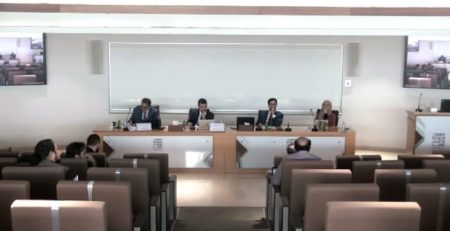Jerusalem between international legitimacy and political settlement
Written by: Dr. Hanna Issa – Professor of International Law
On November 29, 1947, the United Nations General Assembly adopted Resolution No. 181 (2), which stipulated the termination of the British Mandate over Palestine and its division into two states while maintaining an economic union between them and transforming Jerusalem and its suburbs into an independent regional unit with a special international status. From here we see that a radical solution to the Palestinian problem can only be achieved on the basis of Resolution 181, which grants the people of Palestine the right to have an independent and equal existence. However, since its establishment to date, Israel has continued to violate the principles of the Charter of the United Nations, which demands recognition of the right of people to self-determination, national sovereignty and independence, in addition to its unjustified continued occupation of the lands of others adjacent to its borders by waging successive wars.
In 1967, the Security Council adopted Resolution No. 242, which stipulated the withdrawal of Israeli forces from the territories occupied during the June 1967 war and the necessity of establishing a firm and just peace in the Middle East. Since the Israeli occupation remained on the Palestinian territories (the West Bank, the Gaza Strip and East Jerusalem), deciding its future after the withdrawal of the Israeli forces is not just a humanitarian mission, but rather an issue of a purely international political nature and has a direct relationship to the issue of realizing the inalienable national rights of the Palestinian people. The Israeli ruling circles are particularly keen on Jerusalem, whose western part has been illegally declared by Israel as its capital since 1950. This illegal move was firmly rejected by the international community on June 7, 1967. Israel occupied the entire city of Jerusalem. Following its aggression, which began on June 5 of the same year, and in August 1980, Israel annexed occupied Jerusalem. It considered it its united capital.
If we note the date of the annexation, Israel’s annexation of Jerusalem; As well as the history of the Israeli Knesset to legislate the Basic Law. Its content: that Jerusalem is the capital of Israel, where the first article of it stipulates that: “The complete and united Jerusalem is the capital of Israel” (July 30, 1980). It is “law/legislation”. On the basis of which the annexation was established, we say: If we notice this and that. It becomes clear that Israel: Although during its peace with Egypt, it conceals its ambitions to perpetuate the final annexation of Jerusalem and its unification under Israeli sovereignty; It seems that it no longer finds the need to hide anything after the signing of the “Egyptian-Israeli” treaty (in: March 26, 1979).
The position of the United Nations on Jerusalem:
- The consistent position of the United Nations since the beginning of the Palestinian cause in dealing with the issue of Jerusalem independently as a separate entity that must have a special legal system because of its holiness and religious, historical and civilizational importance.
- The United Nations has established an international system for Jerusalem on the basis of what was stated in the partition resolution issued by the United Nations General Assembly in 1974 AD.
- If the internationalization of Jerusalem did not come out to a tangible reality for a variety of reasons, the United Nations has remained firm on the necessity of looking at Jerusalem in a special way and treating it on the basis that there is no distinct legal status.
- The United Nations treats the eastern sector of the city, which fell under the Israeli occupation in 1967 AD, as occupied territory, which Israel militarily occupies, and it must abide by it – like the rest of the occupied Palestinian Territories, with the provisions of public international law on belligerent occupation, including agreements Geneva in 1949.
- The most important thing in the position of the United Nations is that it is based on a sufficient condemnation and denunciation of the administrative and legislative measures taken by Israel, which aimed at changing the legal status of Jerusalem, and considering such measures and laws null and void.
- The decisions taken by the United Nations regarding Jerusalem, whether in the General Assembly or the Security Council, were approved by a large majority without opposition in most cases and unanimously with regard to most Security Council resolutions, which reveals the special view taken by the Member States of the United Nations to put Jerusalem.
- Security Council Resolutions No. 242 and 338 include East Jerusalem as a land that was occupied in 1967 AD, and everything that is said regarding the rest of the occupied Arab lands, regarding the obligation of Israel to withdraw from it, is applied on the basis of the inadmissibility of acquiring lands as a result of the use of force.
As for the contents of international legitimacy vis-à-vis Jerusalem, they are as follows:
- The division of Palestine into two states: an Arab and a Jewish state.
- A special entity in Jerusalem, provided that the final status of this entity is reviewed after the lapse of ten years from its establishment.
- The illegality of Israel’s occupation of Arab lands, including the West Bank and Jerusalem in the foreground.
- The inadmissibility of acquiring the lands of others by force.
- The nullification of all measures to Judaize Arab lands, including Jerusalem, whether legal, political, settlement or demographic, and to demand that Israel immediately refrain from taking any action that would change the religious, civilized and demographic nature of the occupied Arab lands, including Jerusalem.
- The illegality of settlements and Israel’s demand to dismantle the existing settlements.
- Israel’s withdrawal from all occupied Arab territories, including Jerusalem.
- Recognizing the right of the Palestinian Arab people to self-determination, and the establishment of their independent state with full sovereignty over its national soil, with Jerusalem as its capital.
- Condemning the Israeli policy of displacement and settlement and its repeated violations of human rights in the occupied Arab territories, and its failure to implement the Geneva Conventions of 1949, especially the fourth of them, which stipulate guaranteeing human life and rights during war.
In the light of the above, contemporary international law considers the Israeli occupation to be a temporary legal reality in accordance with Security Council Resolutions 242 of 1967 and 338 of 1973. It imposes duties on the Israeli occupation towards the occupied areas and their civilian population. These duties become legal binding rules, especially those rules that apply to the occupation of Israel the city of Jerusalem and the attack on its original Palestinian residents and private and public properties and the deprivation of the Palestinians from extending their sovereignty over the city of Jerusalem, in addition to depriving of Christian and Muslim pilgrims from all parts of the world to visit the holy places. Thus, all of this confirms that the Israeli authorities are evading the application of the legal rules approved by the Fourth Hague Convention of 1907 and the Fourth Geneva Convention of 1949 on the occupied city of Jerusalem and the rest of the occupied Palestinian territories.
All of the above-mentioned resolutions have been approved by the international community. They clearly affirm that East Jerusalem is an occupied Arab land, and it is not permissible to change the demographic or political situation in it, and that any change is considered null and void. It decides the illegality of the measures taken by “Israel” as a result of its occupation of the territories of these countries. It confirms the invalidity of actions issued in violation of the rules of international law, and supports the principle of legality based on the idea of the rule of international law to replace the principle of effectiveness, which is based on the fact that the de facto corrects actions, since these rules are related to the supreme and fundamental interest of the international community, those who disbelieve in them can only obey their provisions, which is not permissible to agree on anything that contradicts them by the singular will of any country, because they are rules that are guaranteed with a decisive penalty represented in the nullity of every act that violates them is absolutely null.
The right is not built on falsehood. When this falsehood is related to the attempt at regional change between states, we are faced with a case of violating the legal rules in the public international system, which all efforts should unite to stop it, and warn of a risk.












Leave a Reply